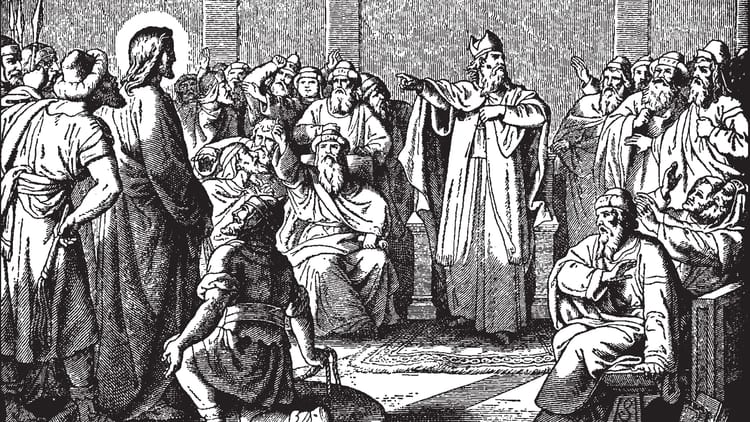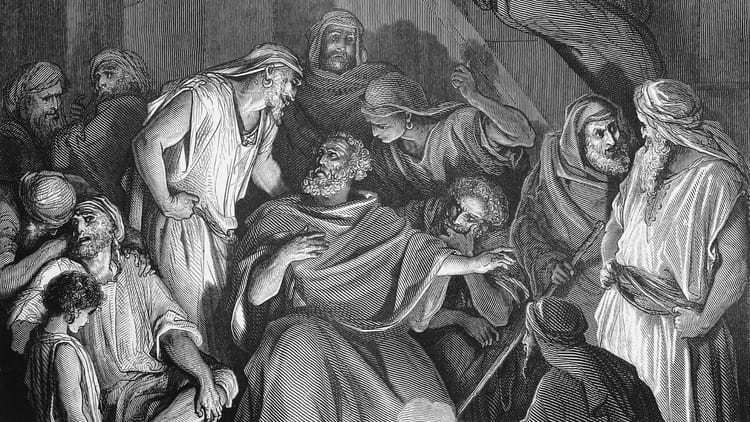More Than Crumbs (Mark 7:24-8:10)

Today’s passage is unsettling at first. You can’t read it without wondering if Jesus is being a tad insensitive – even rude – to a woman who genuinely needs help. It also leaves you with some questions. Why is Jesus so dramatic when he heals a deaf person? And then it also seems a little repetitive. Jesus feeds another crowd with a few loaves and small fish. So it’s a passage that gets under the skin and raises all kinds of questions.
But it’s also a startling passage that actually gives a lot of hope to those of us who feel like we’re the least likely people to be part of what God is doing. If you feel like you don’t quite belong, or that there’s a whole list of reasons why you shouldn’t be in relationship with God and part of what he’s doing, then this passage is for you.
Let’s look at the three stories this morning. We’re going to see first why we’re not worthy to be part of Jesus’ kingdom, why this doesn’t matter, and then why this is good news for everyone here this morning.
First, let’s look at all the reasons that we’re not worthy, all the reasons why we shouldn’t be part of God’s kingdom and what he’s doing.
In verse 24 we read that Jesus leaves from the Sea of Galilee area to the area around Tyre, which would have been on the coast of the Mediterranean. To understand what’s about to happen here, you need to know why this is significant. Jesus is moving from a predominantly Jewish area to an area that was much more Gentile, much more Greek. He was traveling to an area that was known for its paganism. Tyre is a place known in the Old Testament as being wicked. It’s the hometown of Jezebel, one of the famous villains of the Hebrew Scriptures. Josephus, who was a Jewish historian who lived shortly after this time, said that the people of Tyre are “as our bitterest enemies.” It’s also an area that, at the time, was known to be economically oppressive towards where Jesus was coming from. Tyre was known for eating food produced in Galilee while Galilee itself went hungry.
Why did Jesus leave Galilee for this Gentile and, from a Jewish perspective, somewhat shady place? I think there are a couple of reasons. Twice now Jesus has tried to get away with his disciples for a period of rest. Every time he tries to get away, though, the crowds follow him. It looks like this may be another attempt. “He entered a house and did not want anyone to know it,” according to verse 24. If you study this passage carefully and map out Jesus’ route, you’ll notice that he goes way out of his way to avoid Galilee. Jesus is aware that the crowds want him as king, but that the political and religious leaders want him dead. So he takes some time to get away with his disciples out of the spotlight and away from all the demands. They are trying to lie low for a while after Jesus has said and done some risky things. They are not there to preach and to heal. They just want to get away for a short time.
This helps us understand the emotional tone of the end of verse 24. “He entered a house and did not want anyone to know it; yet he could not keep his presence secret.” It also helps us understand a little bit about the exchange between Jesus and the Greek woman born in Syrian Phoenicia. There is hardly a less likely person to get anything from Jesus in all the gospels. She’s Gentile and is not part of the covenant that God made with the Jewish people. She has no business approaching a Jewish rabbi.
She really has three strikes against her. One: she’s a woman at a time when women were not viewed as equal to men. Two: she’s a Greek Gentile at a time of great tension between Jews and Gentiles. The Messiah was expected to subdue and expel the Gentiles, not to visit and embrace them. Three: she’s from pagan Syrian Phoenicia, which is a pretty shady place for anyone coming from Israel, especially from Galilee. You could even add a fourth strike: Jesus isn’t there to heal or minister. He’s there to get away. There’s no reason to expect Jesus to respond positively to this woman.
That’s why Jesus responds the way that he does to her. She came to Jesus and begged him to drive the demon from her daughter. Jesus replied in verse 27: “‘First let the children eat all they want,’ he told her, ‘for it is not right to take the children’s bread and toss it to the dogs.'”
What is this? In Jesus’ day, Jews often referred to Gentiles as dogs. We’re not talking men’s best friend either. We’re talking about wild dogs, repulsive scavengers that get into your garbage and eat everything and are never satisfied. They were seen as the most despicable, insolent, and miserable of creatures. It seems shocking that Jesus would buy into this type of language. It’s pretty hard to avoid seeing these words as being somewhat scandalous, somewhat offensive.
But if that’s all you see, then you aren’t seeing enough. Jesus didn’t use the normal word for a scavenger dog. The word he actually used was not the one that was normally used by Jews to refer to Gentiles. He didn’t call her a wild scavenger dog roaming around the countryside. He used a word that means small dog, the type of dog you would keep as a household pet.
This still sounds offensive, and it probably should sound a little offensive, but we need to see what this woman actually came to see. Jesus was speaking using a parable. He’s giving us an image that communicates a message. When Jesus had sent the disciples out, we read in Matthew that he said, “Do not go among the Gentiles or enter any town of the Samaritans. Go rather to the lost sheep of Israel” (Matthew 10:5-6). Jesus was clear about his purpose. His purpose at this point was not to spread the gospel to the Gentile world, but to tell the Jewish people that their long-awaited salvation was at hand. He came to bring salvation to Israel. Later on the gospel would be shared with the entire world, but not yet. Jesus had a specific task and limited time, and this woman was jumping the queue. Jesus was saying, in essence, “I really need to feed my family first. Your turn is coming.” Jesus wasn’t called to go around and be helpful to everyone. He had to bring his salvation and his kingdom to Israel before it could be offered to the whole world.
We’re going to see in a minute that this woman actually gets and agrees with Jesus’ statement. But let’s pause for a minute and consider that there are probably some of us here who can relate to this fascinating woman with four strikes against her. There are probably some of us here who would have to say that there’s no real reason why Jesus should choose to respond to our cries. There are some of us who were raised in church, and you’ve never done anything scandalous in your life. You look like you’ve been in church every Sunday in your life, except for two weeks when you were sick back in the second grade. But there are others here who could easily come up with four reasons why Jesus should look at you and say, “Sorry, not interested.” We can come up with lots of reasons why Jesus should look at us and say that it’s not our turn just yet. What happens to this woman matters a lot to us.
And that’s why it’s so surprising to discover what did happen. This woman finds a way through.
Let’s look at how this woman teaches us that our unworthiness doesn’t even matter when we come to Jesus.
What’s shocking is that this woman, with so much against her, actually gets it. This is amazing. Hardly anyone in Mark’s gospel grasps what Jesus says to them, but she does.
How would you respond if Jesus said to you like he did to her? Some of us would slink away. Jesus has used the image of a dog. You’ve seen a dog with its ears tucked down, tail between its legs, scampering away. That’s what some of us would have done. Jesus’ challenge would have been enough to put us off.
Some of us would have defended ourselves. We would have said, “How dare you compare me to a dog?” We would have put up a fight saying that we deserved some of what Jesus offers. Our argument would be about who we are and what we deserve.
But this amazing woman doesn’t scamper away, nor does she defend herself by arguing based on her merit. Look at what she says instead: “‘Lord,’ she replied, ‘even the dogs under the table eat the children’s crumbs'” (Mark 7:28).
This woman has a clearer understanding of Jesus’ mission than anyone else we’ve met in Mark so far. She’s the first person in Mark to get it and to engage Jesus in a constructive dialogue. She refuses to take no for an answer, and she becomes like a female version of Jacob wrestling with the angel, saying, “I will not let you go unless you bless me” (Genesis 32:26).
And what is the basis of her argument? Her argument is that the life-giving bread of Jesus’ kingdom is so abundant that there is more than enough to feed not just Israel, but the entire world. She gets it. Bread here is an image of all the blessings of the Messiah’s ministry. She understands that there is so much blessing found in what Jesus is doing that there’s food enough for her, even though she is the most unlikely of persons to share in what God is doing.
Do you understand what she’s doing? She’s actually given us insight into the only way we can share in the blessings of Jesus’ salvation. We’re not worthy. We should never come to Christ arguing that we have a right to the blessings that he brings in his kingdom. We clearly don’t. But we can grab hold of Jesus, admit that we don’t deserve the blessings of his kingdom, and then argue based on the abundance of God’s grace. Because God’s grace is so abundant, even the crumbs will be enough. The bread of Jesus’ saving kingdom is so abundant that it’s available to all, even the most unlikely person.
When we scamper away, or argue based on our merit, we forfeit the blessings of what Jesus has done. But when we down at his feet and argue based on the abundance of his provision, we’re on very solid ground. There’s more than enough in what Jesus provides to overcome anything that could keep us away.
Jesus replied to her, “For such a reply, you may go; the demon has left your daughter.” And then we read, “She went home and found her child lying on the bed, and the demon gone” (Mark 7:29-30).
Somebody’s said, “Her only cover letter was her desperate need.” But when we come to Jesus, all we need is need, because the bread of Jesus’ saving kingdom is so abundant that it’s available to all. Martin Luther said of her, “She took Christ at his own words. He then treated her not as a dog but as a child of Israel.”
We’ve seen all the reasons why this woman shouldn’t have received the blessings of Jesus’ kingdom. And we’ve seen why this didn’t matter: because she understood that there’s more than enough in what Jesus is doing for everyone. Mark wants us to see one more thing from this passage.
He wants us to understand why this is good news for everyone here this morning.
Mark follows this incident with two other ones, not because they happened next. In fact, there are some hints that the last incident he mentions didn’t necessarily happen next. He ties them together because he wants us to see that this woman was right. He wants us to see how the abundance of the bread in Jesus’ kingdom is good news for everyone.
In verses 31 to 36, Jesus travels to another Gentile region on the other side of the Sea of Galilee. There Jesus encounters a man who’s deaf and has a speech impediment. You’ll notice the drama involved with the healing. Jesus takes him aside, touches his ears and tongue, looks up to heaven. What’s Jesus doing here? His healings aren’t usually this dramatic. What’s he doing? He’s signing. He’s communicating through his movements what he is doing to someone who can’t hear his words. Just as Jesus has healed those who belong to Israel, Jesus now heals a Gentile. Remember that the miracles of Jesus point to what the kingdom will one day look like? Jesus demonstrates here that Gentiles are going to share in all the blessings of the kingdom, where there will be no evil or illness or death. What Isaiah prophesied is true even for the Gentiles:
Then will the eyes of the blind be opened
and the ears of the deaf unstopped.
Then will the lame leap like a deer,
and the mute tongue shout for joy.
Water will gush forth in the wilderness
and streams in the desert.
(Isaiah 35:5-6)
And then we read about Jesus feeding four thousand with just a few loaves of bread and a few small fish. He’s just fed five thousand back in chapter 6. Why include a similar event here? There are some differences. There are fewer people, more loaves, and less food left over. The biggest difference, though, is that this meal takes place among the Gentiles. Jesus makes his bread available to a wider Gentile community. He is the living bread for Gentiles as well. They also ate and were satisfied. Mark is telling us that everyone is invited to participate in the Messianic banquet. All are invited to come and be satisfied.
And that’s why it’s good news for everyone here this morning. Even the most unlikely person is invited to come. Your invitation to eat the bread has nothing to do with your worthiness; it has everything to do with the abundance of what has been provided for us in Jesus Christ. All you need is need. You can come eat the bread of life, and be satisfied.
Father, this morning I pray especially for those who are the least likely to experience the blessings of the kingdom. There are many here today who would never think they would have a place at the table with Jesus.
But today you’ve shown us that the blessings are available to everyone, because the blessing is not based on how worthy we are. It is based on the abundant provision of blessings that are available in Jesus Christ.
This is very good news. So I pray that the most unlikely people today would come and wrestle, refusing to leave until they get a blessing. May they fall before Jesus’ feet and argue for even crumbs from his table. May their ears be opened, and may they find their place at the table. May they understand the salvation that is available to them through Jesus and what he has done, and may they eat and be satisfied. In Jesus’ name we pray, Amen.





